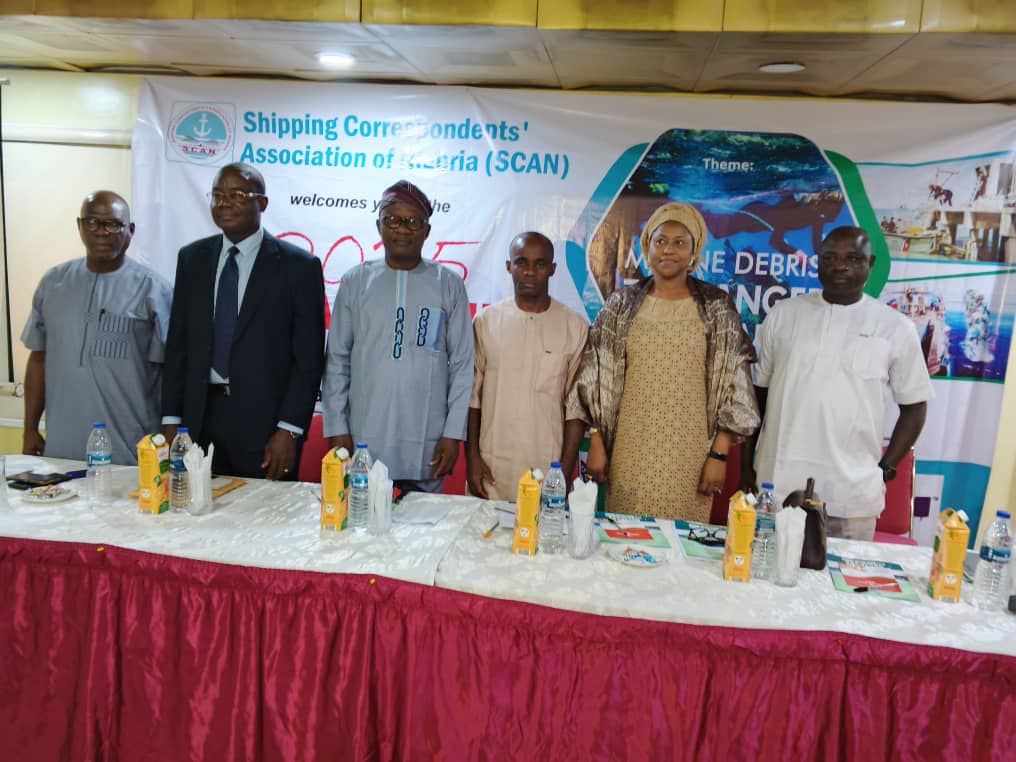In a concerted effort to address the escalating threat of marine debris and safeguard the future of Nigeria’s oceans, stakeholders in the maritime sector have called for the formulation of a comprehensive national policy framework.
The call was made during the 2025 Annual Summit of the Shipping Correspondents Association of Nigeria (SCAN), held in Apapa, Lagos, on Thursday.
Participants at the summit warned that marine debris not only impairs navigational safety and port operations but also pollutes coastlines, damages tourism, endangers coastal livelihoods, and poses significant public health risks.
Managing Director of the Nigerian Ports Authority (NPA), Abubakar Dantsoho, represented by Capt. Femi Oyewole, Principal Manager, Marine at the NPA, stressed that marine debris presents a growing danger to marine biodiversity, particularly affecting fish, marine mammals, and seabirds through entanglement and ingestion.
“As custodians of Nigeria’s seaports, the NPA is deeply committed to supporting both national and global initiatives to combat marine litter and preserve the integrity of our marine ecosystems,” Dantsoho stated. “These dangers are no longer distant possibilities—they are real and growing.”
He noted that the NPA has taken several proactive steps, including the operation and regulation of port reception facilities across Nigeria’s major ports, in full compliance with the International Convention for the Prevention of Pollution from Ships (MARPOL 73/78), particularly Annex V. These facilities, located in the Lagos, Delta, Bonny/Port Harcourt, and Calabar Pilotage Districts, handle a wide range of ship-generated waste, such as plastics, food scraps, oily rags, and hazardous residues.
“These efforts discourage illegal disposal of waste into the marine environment and ensure environmentally sound treatment, recycling, or disposal of marine waste,” he added.
In addition, he said NPA conducts regular marine litter and seaweed cleanup exercises within and around port channels, berths, and quay aprons to remove plastics, packaging, and other waste that block drainage systems and hinder vessel operations.
Also speaking, Executive Secretary and CEO of the Nigerian Shippers Council (NSC), Pius Akutah, represented by Deputy Director of Monitoring and Enforcement, Adeshina Sarumi, commended SCAN for spotlighting such a critical issue. He stressed the need to clear water channels for the safe navigation of vessels, warning that waste-clogged waterways hinder economic activities.
Akutah also urged the media to ensure factual and accurate reporting to support the effectiveness of maritime regulatory agencies.
Meanwhile, Managing Director of the National Inland Waterways Authority (NIWA), Bolaji Oyebamiji, represented by Assistant General Manager Mrs. Aisha Eri, called on stakeholders to be proactive and emphasized the importance of public education, especially among residents of coastal communities.
“Marine waste is a global issue, not just a Nigerian one,” he said. “While NIWA and other agencies are making efforts, it is crucial for coastal residents to stop polluting our waters.”
Guest speaker and President of the Nigerian Association of Master Mariners, Captain Tajudeen Alao, represented by Second Vice President Captain Olugunwa Jide, lamented that key waterfronts which could serve as tourist hubs have been overrun by debris. He warned that continued neglect would erode Nigeria’s competitiveness in the global maritime sector.
He called for a legislative framework backed by the National Assembly, including strict penalties — suggesting fines of up to N5 million — for individuals and entities caught illegally dumping waste.
SCAN President Moses Ebosele said the summit’s theme, “Marine Debris: The Danger Ahead,” was chosen to highlight the urgent need to confront the rising crisis of marine pollution.
“The growing prevalence of marine debris is not just an environmental issue; it is a socioeconomic threat that can undermine the foundations of our maritime industry and coastal communities,” Ebosele warned.
